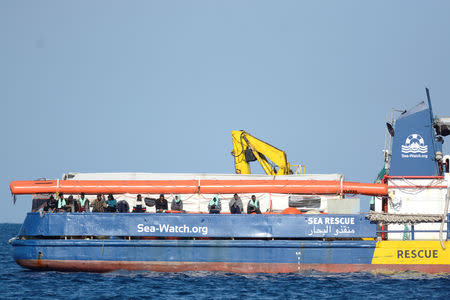Dutch refuse Italian request to accept 47 migrants on rescue ship-govt

AMSTERDAM (Reuters) - The Netherlands refused on Monday an Italian request to take in 47 migrants on a humanitarian ship that is being blocked from Italian ports, saying there was a need to distinguish between genuine refugees and economic migrants.
The Sea Watch 3, run by a German humanitarian group and flying a Dutch flag, rescued the migrants from a rubber boat off the Libyan coast more than a week ago. Since then it has been buffeted by high winds and 7-metre (23 ft) waves.
Italy's Deputy Prime Minister Luigi Di Maio, leader of the 5-Star Movement, said the ship should go either to France, which he has accused of shirking its responsibilities to the migrant influx, or to the Netherlands.
The Dutch Justice and Security Ministry, which oversees immigration policy, said it would not take in any migrants from Sea Watch until there was a long-term agreement on how to distinguish refugees from economic migrants.
"Those who are not entitled to international protection need to be sent back immediately on arrival at European borders," it said in a statement.
"Without a clear perspective for such a structural solution, the Netherlands will not participate in ad hoc measures for the disembarkation."
Italian Prime Minister Giuseppe Conte's office said in a statement that Rome would refer the matter to the European Court of Human Rights, reiterating that the government had no intention of allowing the boat to dock in Italy.
It added that as soon as Dutch responsibility was ascertained, it would help open up a "human corridor" to let the migrants move to the Netherlands. Conte also promised to provide supplies and medical care if needed to the NGO boat, which is moored off the Sicilian coast.
It is the second time in a month Sea Watch has been stranded at sea with rescued migrants and no safe port. The last standoff ended after 19 days and an agreement among eight EU countries, including Italy, to take in the migrants.
The Netherlands, which took in hundreds of thousands of migrants in the 1960s and 1970s to work as labourers, has adopted one of the tightest immigration policies in Europe following a public backlash.
The Italian statement on Thursday questioned why Sea Watch had decided to brave stormy waters and head to Italy, rather than take the migrants to nearby Tunisia. "Did the Sea Watch aim to rescue people ... or to create an international incident?"
(Reporting by Anthony Deutsch and Bart Maijer; Editing by Gareth Jones and Crispian Balmer)

